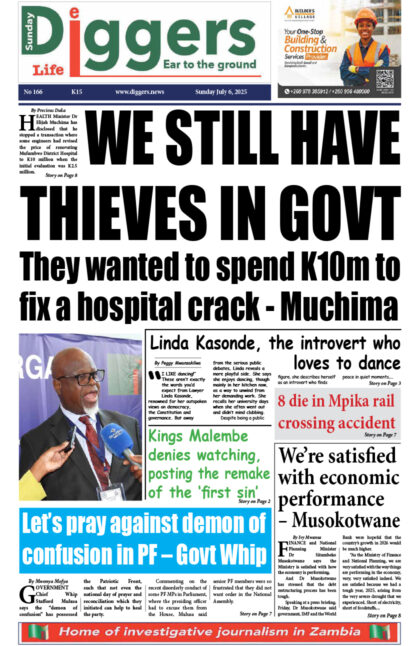FINANCE and National Planning Minister Dr Situmbeko Musokotwane says there is need for the country to restore macro economic stability and debt sustainability in order to grow the agriculture sector.
Speaking during the Indaba Agricultural Policy Research Institute (IAPRI) 2022 Agricultural Budget analysis, Wednesday, Dr Musokotwane said debt servicing had affected the growth of the agriculture sector.
“Agriculture is part of the overall economy. If the other sectors are not performing well, agriculture is going to be pulled backwards. We are all aware of the macro economic stability that has been taking place in this country; the shooting up of the exchange rate, the rise in the interest rates. Those appear to be macro economic issues but they affect the agriculture sector. So one of the things that we are tackling therefore is to bring back macro economic stability so that we can live within predictable exchange rates, predictable interest rates, and also one of the things that has adversely affected farmers is the issue of demand. If you go into some of these places, the turnover in many institutions is going down, why? Because of the macro economic stability,” he said.
“The heavy amount of debts that Zambia collected all over the world meant that as we were servicing this debt, foreign exchange was drained out from this economy, money was being drained out of this economy. People used to afford to buy chickens, people used to buy all sorts of agricultural products. They found that they could no longer afford and therefore farmers were struggling.”
He said he was hoping the International Monetary Fund (IMF) give Zambia a bailout package before the end of 2021.
“We have to deal with this problem of excessive debt. Where we sit right now we are in active discussions with the IMF and what we are hoping to do is that by the end of this year, if not much earlier, we come to some agreement with the IMF on a programme. That will now enable us to discuss with various creditors so that we rearrange the national debt, as we know that we are defaulting to many creditors, which was not good. We have to pay but the level of debt is just too much. So, we need to get into that discussion so that we rearrange the debt, so that we can pay and become respectable. But at the same time, pay in such a manner that we do not drain liquidity excessively out of this country and make you fail to sell. So the issue of reestablishing macro economic stability and debt sustainability is something that we are pushing very high,” he said.
Dr Musokotwane stressed the need to grow the economy.
“We need to make the economy grow. As you have heard in the past decade, the growth rate in certain years like last year was negative, in certain years the growth rate was more modest. It is the growth of the economy that puts money into the pockets of consumers. If growth is not taking place, that buying power from the pockets of the people will not be there. So it is important to reestablish those buying powers and the way to do that is by growing the economy. So going forward, therefore, to make this economy to grow and to reestablish the buying power, we have to revive the mining sector as we have spoken,” he said.
And Dr Musokotwane said an export led agriculture sector was needed for wealth creation.
“We will continue to provide support to the small scale farmers through FISP. But the big change is that the agriculture sector, you can not only see it as welfare, this is an industry like others. We must also support those who are operating at large scale because they too in fact are creating more jobs direct and indirectly. The example I like giving is Nakambala. My dream is that in the next 10 years, if it was possible we have 100s of Nakambalas because the space is there, we are not going to push anyone from the land. When you tell people to be productive, automatically you are saying to them that we are going to export, because the market for producing large quantities is limited in Zambia but it is available in the region. In short we are talking about an export led agriculture sector, that is what is going to bring wealth in this country,” said Dr Musokotwane.
“As far as the big job is concerned we are very active in engagements with some of the multilateral lending institutions, specifically with the world bank. I am hoping that by next year we can have supplementary funding to the Ministry of Agriculture through the World Bank so that those farming blocks that we are talking about, there will be electricity, there will be roads within the farming block, there will be systematic and well coordinated plans. We are targeting that starting next year, money for that will be available. We have made it very clear to our partners that the time for giving us essays and plans is over. If there will be essays, it is something that tells us that this is where the road is going to be .So money for farming blocks will be available.”



















